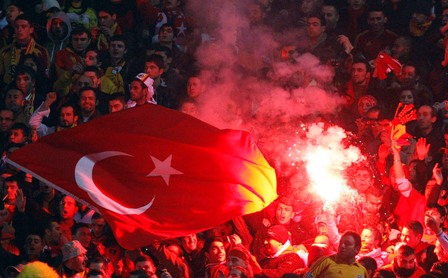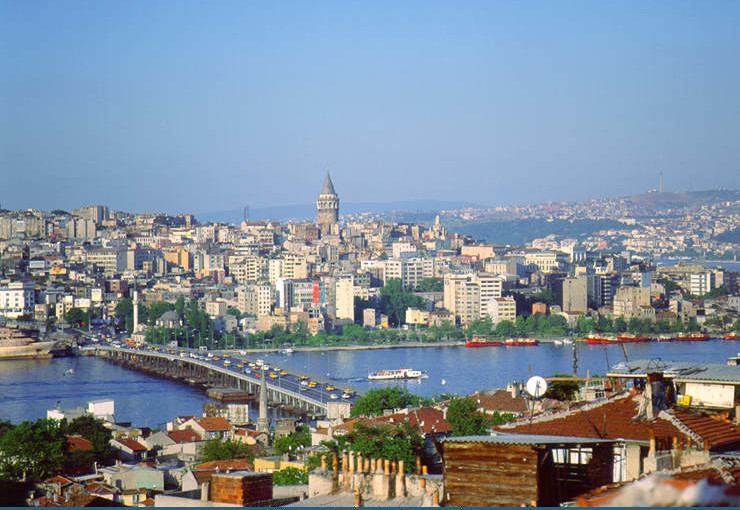By David Owen in Istanbul
April 14 – Coaches call it a winning habit. Usually it refers to events on the field of play. But Turkey is starting to develop a winning habit when it comes to bids to host international sports events.
After years of failure in this specialised and esoteric domain - I have lost count of the number of times Istanbul has bid unsuccessfully for the Olympics - the tables are starting to turn.
Later this year Turkey will host the world championships of one big Olympic sport - basketball.
In 2012, three more major international competitions will follow: the short course swimming World Championships; the World Indoor Athletics Championships and the World Amateur Team Golf Championship.
The burning question now is whether this large slab of a country, which joins Europe and Asia between the Black and the Mediterranean Seas, can finally land its biggest catch yet - the European football championship.
It will not be easy: Turkey’s rivals in the race for the 2016 tournament - its third successive attempt to win this prize - are France and Italy, nations with enviable footballing pedigrees and political contacts.
The soundings I am getting though suggest that this time Turkey - which has hosted both the UEFA Champions League and UEFA Cup finals in recent years - has a serious chance.
After a short trip to Istanbul this week, funded by the Turkish Football Federation, I can report that I have rarely encountered a bid in which the desire to win has been more plainly manifest among its leaders.
“It’s such an important topic for us that we are bidding for the third time consecutively,” says Orhan Gorbon, the earnest but approachable young bid manager.
“We have learnt a lot from our experiences; each time we have improved our proposal…
“We believe it shows our consistency, our dedication, our passion for this tournament that it’s the third time [we have bid].”
There is more to the Turkish bid than will to win of course.
Prime Minister Recep Tayyip Erdoğan has guaranteed a hefty €920 million (£814 million/$1.2 billion) for stadium construction.
Six new stadia are planned around the western half of the country, with refurbishment of the imposing 75,000-capacity Atatürk Olympic Stadium also slated.
Meanwhile tens of billions of euros are being pumped into infrastructure improvements by a country which, having experienced its economic crisis significantly earlier than most of the rest of us, now looks comparatively well placed.
“There was a very severe crisis in 2001 and then the banking industry was reformed immediately thereafter,” Gorbon explains.
“Then the current Government came into power in 2002 and they made an enormous effort to improve the economy and they were very well prepared for this crisis.”
Legacy - the buzz-word of the day for international sports bodies - is an issue on which the bid, with its potential to tap into a young audience in a majority Muslim country in a relatively uncharted corner of the continent, should also score well.
Gorbon goes as far as to say that a decision by UEFA to award the tournament to Turkey would be “remembered as a historical decision”.
There remain a few areas where Turkey still has an image problem in the eyes of many western Europeans.
On one of these - the bad reputation of some Turkish football supporters - it is clear that the authorities are working hard, with one senior football official arguing that the sprouting of comfortable modern stadia around the country should contribute significantly to improving the situation.

“We don’t want Hell in Turkish football stadia,” asserts another official, in reference to Turkish club Galatasaray’s soon-to-be-superseded red and yellow Ali Sami Yen Stadium in Istanbul.
“We want Paradise.”
Meanwhile, Gorbon assures me that the paucity of proposed tournament venues in eastern Turkey has nothing to do with the Kurdish problem.
“It’s a summer event and you want to be close to the sea,” he says.
“We want to create the most beautiful environment for UEFA.”
He indicates that if it had been up to him, Turkey’s plans would have been focused more narrowly along the country’s tourist-friendly western shoreline.
More potentially damaging for Turkey’s chances, I suspect, are the difficulties UEFA is experiencing in Ukraine, one of the hosts for the Euro 2012 tournament.
UEFA President Michel Platini last week gave Ukraine only two months to get preparations for the competition back on track if they are to continue to co-host them with Poland.
Having made one adventurous choice only to encounter unexpected difficulties, might UEFA shy away from what many would perceive as another - ie awarding the 2016 competition to Turkey - and ‘play safe’ by choosing France or Italy instead?
Gorbon is frank and realistic enough to acknowledge that this possibility exists.
“Yes, I think it is definitely an issue,” he tells me.
“I can understand that a lot of people in Europe would consider France and Italy as a safer choice.
“But I totally disagree because you have energy here, you have growth here, you have investment plans here, whereas it’s much more stagnant in western Europe.
“What has happened in Turkey in the last five years is breathtaking.”
With a decision due on May 28, we are entering what a certain well-known football manager might refer to as “squeaky bum” time for the bidders.
Of the 13 UEFA Executive Committee members eligible to vote, I have an idea that at least four or five might be minded to make Turkey their first choice.
Can Gorbon and his energetic team build on that to secure the seven run-off votes that would bring Euro 2016 to the banks of the Bosphorus?
All will be revealed next month in another celebrated waterside city - Geneva.
Contact the writer of this story at zib.l1745242628labto1745242628ofdlr1745242628owedi1745242628sni@n1745242628ewo.d1745242628ivad1745242628
David Owen is a specialist sports journalist who worked for 20 years for the Financial Times in the United States, Canada, France and the UK. He ended his FT career as sports editor after the 2006 World Cup and is now freelancing, including covering last year’s Beijing Olympics. An archive of Owen’s material may be found by Twitter users at www.twitter.com/dodo938
Related stories
April 2010: Turkey has confidence in UEFA that Euro 2016 contest will be fair
April 2010: UEFA begin inspection of Turkey bid for Euro 2016
February 2010: Euro 2016 candidates present bid books
January 2010: Turkish Euro 2016 bid gets major investment boost
December 2009: Fenerbahce angry over Euro 2016 snub

